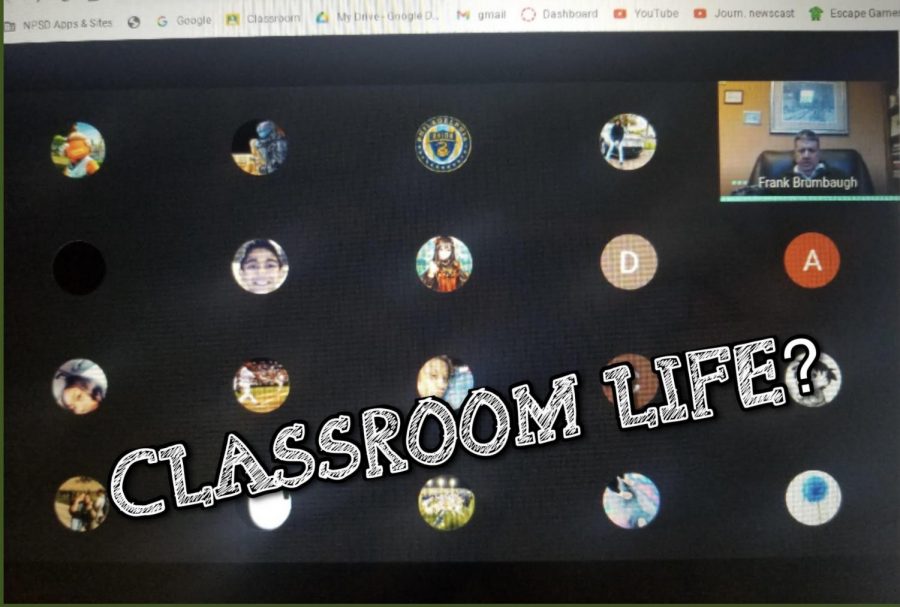Virtually silent? Examining Google Meet etiquette
Hello? Are you there Johnny?? This screen of avatars has become the greatest roadblock to teaching and learning for some teachers and students.
Red microphones, countless icons spread throughout the screen, and a teacher attempting to teach the best he or she can without being able to see the students. These are the normalities that many teachers and students have come to realize throughout their google meets each day. However, the truth is that this is not the way anybody gets the most out of education.
Several students have made the comment that they are just not able to learn well virtually. Although students make this claim, some of them are not putting in much effort on their end. This lack of effort can be from what they are doing to where they are during a meet.
One place students spend time learning during the day that they shouldn’t be is in their bed. Learning in bed is just not going to cut it. This in fact, confuses the brain and can ruin not only learning, but also sleeping habits.
“Mixing sleep and study in the same location sends mixed signals to the brain,” Nursing Professor Patricia Carter wrote in an email to the Daily Texan. “It does not know which it is supposed to be focusing on. This leads to less effective studying (and) learning, and it makes it harder to fall asleep when you want to.”
This kind of effort displayed is the thing that frustrates teachers to no end. For all of the effort a teacher puts into making online lessons and classes run so smoothly, the lack of effort in this way and much more is just not an even two-way street.
For North Penn High School English teacher, Ms. Alexandra Haeusser, all she wants is for students to pay attention. In a perfect world, all of her students would prove to her their attention is on the class by turning cameras on.
“My number one expectation is that students are paying attention throughout the duration of class,” Haeusser said. “Ideally I would be able to tell students were paying attention throughout class because they would leave their cameras on.”
North Penn High School Social Studies teacher, Mr. Sam Brumbaugh believes that turning the camera on is something students should do not only for their teacher to be able to see them, but also as a common courtesy in life.
“If I was in school I’d at least give my teachers some face time because it is common courtesy,” Mr. Brumbaugh stated.
As well as turning cameras on, Haeusser wants students to prove that their attention is on the class by simply answering questions during conversations or while going over an activity, even if you have to use the chat bar.
“Another way I expect students to show their engagement is by answering questions by unmuting themselves or answering in the chat bar,” Haeusser stated.
Mr. Brumbaugh says his most frustrating times in a meet are when he calls on someone and that person doesn’t answer the question asked. This moment turns into a rather awkward time as he waits for the student to answer. He is also unable to tell if the student is actually paying attention in class.
“The most frustrating thing in a meet is when I call on somebody and I don’t get a reply. It becomes awkward and I have to move to someone else. I don’t know if their mic is not working or if they are not paying attention,” Brumbaugh said.
The reasons that these types of behaviors are important to teachers is that they need to be able to gauge a student’s understanding of their class. Without turning cameras on or answering questions, it is impossible for a teacher to be able to tell how a student is grasping a concept.
Any frustration a student is facing is easily detected and solved when a teacher can see their face. Simple things such as expressions and movements can tell a teacher your confidence level to the max.
“In class I am reading people, their body language, their cues, and little motions that help you to see if someone is getting something and things are connecting,” Brumbaugh explained. “You can tell when you look in people’s eyes all sorts of things, and you don’t get that when cameras are off.”
In a virtual setting, a teacher has to work with a student more than ever. However, this is also the case with the fact that a student has to cooperate with their teacher more than ever before. Simply following instructions is not benefiting only the teacher, but also the student.
“I think what students need to remember is that they are in a partnership with their teachers more than ever in a virtual world and a teacher asking a student to turn cameras and microphones on is not only for the benefit of the student, but for the benefit of students and teachers together,” Haeusser explained.
Perhaps the most important of all for any student wishing to further his or her education in any way is that writing a proper recommendation letter is nearly impossible to do without seeing or hearing from a student in a meet.
“It would be a lot harder to write a really strong recommendation for a student who did not have their camera on during the meet because I wouldn’t be able to truthfully or honestly say whether that student was engaged in the class throughout the whole time,” Haeusser said.
So not only can a student’s year this year be affected by their behavior, but their future in life may be affected. With all of the effort teachers put into making and executing their plans, the least a student could do on their end is to put that same effort into learning and display proper behavior and etiquette within their google meets.


